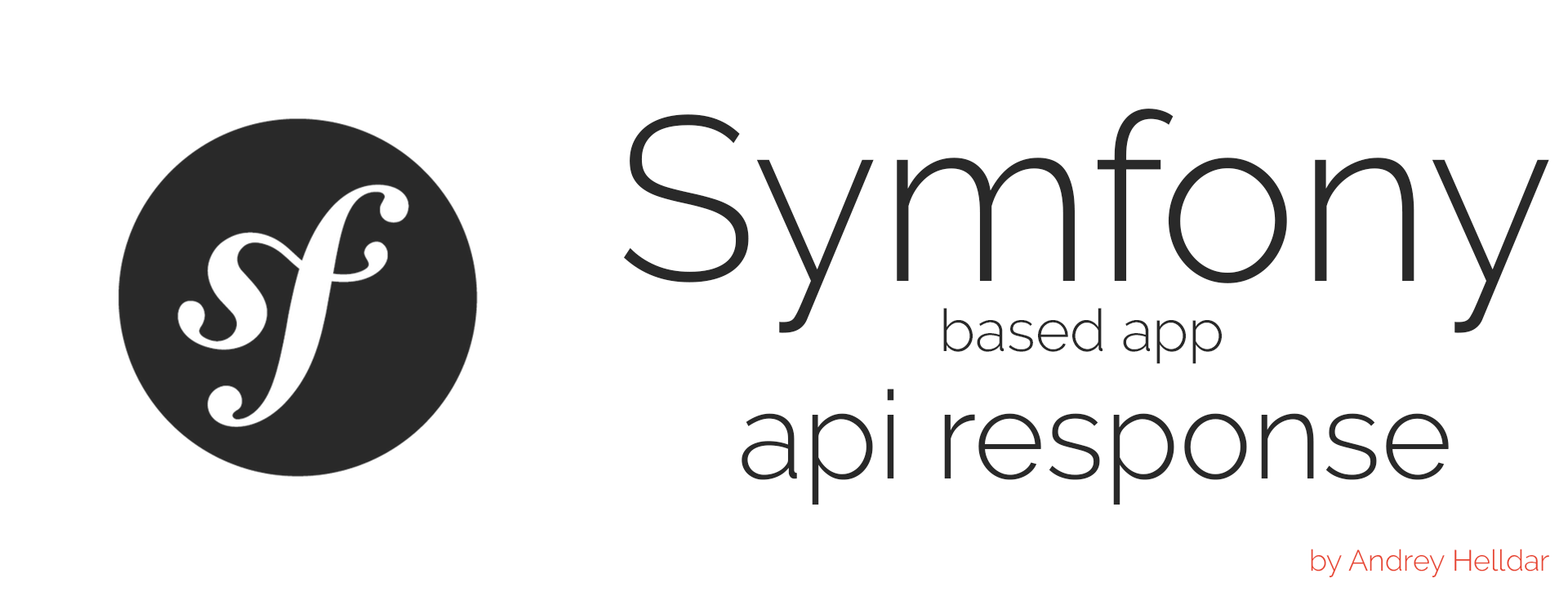Package for standardizing the responses from the API of your Symfony based applications.
- Installation
- Using
- Copyright and License
To get the latest version of API Response, simply require the project using Composer:
$ composer require andrey-helldar/api-responseThis command will automatically install the latest version of the package for your environment.
Instead, you may of course manually update your require block and run composer update if you so choose:
{
"require": {
"andrey-helldar/api-response": "^6.0"
}
}Alright! Use api_response() helper.
| Package version | PHP min version | Symfony version | Support | Links |
|---|---|---|---|---|
| ^4.0 | 5.6.9 | ^3.0, ^4.0 |  |
--- |
| ^4.4.1 | 5.6.9 | ^3.0, ^4.0, ^5.0 |  |
--- |
| ^5.0 | 7.1.3 | ^4.0, ^5.0 |  |
--- |
| ^6.0 | 7.3 | ^4.0, ^5.0 |  |
Upgrade guide |
return api_response(null, 304);return with code 304:
{
"data": null
}return api_response(304);return with code 200:
{
"data": 304
}return api_response('qwerty');return with code 200:
{
"data": "qwerty"
}return api_response('qwerty', 400);return with code 400:
{
"error": {
"type": "Exception",
"data": "qwerty"
}
}return api_response(304, 400);return with code 400:
{
"error": {
"type": "Exception",
"data": 304
}
}$data = [
[
'title' => 'Title #1',
'description' => 'Description #1',
],
[
'title' => 'Title #2',
'description' => 'Description #2',
],
];return api_response($data, 400);return with code 400:
{
"error": {
"type": "Exception",
"data": [
{
"title": "Title #1",
"description": "Description #1"
},
{
"title": "Title #2",
"description": "Description #2"
}
]
}
}return api_response($data, 200);return with code 200:
{
"data": [
{
"title": "Title #1",
"description": "Description #1"
},
{
"title": "Title #2",
"description": "Description #2"
}
]
}If the first parameter is a number, then the decryption of the error by code will be return. In other cases, the value of the passed variable will be return.
return api_response('title', 200, ['foo' => 'bar']);return with code 200:
{
"data": "title",
"foo": "bar"
}return with code 400:
{
"error": {
"type": "Exception",
"data":"ok"
},
"foo": "bar"
}return api_response(['data' => 'foo', 'bar' => 'baz']);return with code 200:
{
"data": "foo",
"bar": "baz"
}return with code 400:
{
"error": {
"type": "Exception",
"data":"foo"
},
"bar": "baz"
}If you do not want to wrap the response in the data key, then you need to pass the false value to the 5th parameter of the function:
use Helldar\ApiResponse\Services\Response;
use Symfony\Component\HttpFoundation\JsonResponse;
/**
* Return a new response from the application.
*
* @param mixed|null $data
* @param int $status_code
* @param array $with
* @param array $headers
* @param bool $use_data
*
* @return Symfony\Component\HttpFoundation\JsonResponse
*/
function api_response(
$data = null,
int $status_code = 200,
array $with = [],
array $headers = [],
bool $use_data = true
)
{
return Response::init()
->data($data, $status_code, $use_data)
->with($with)
->headers($headers)
->response();
}return api_response(null, 304, [], [], false);return with code 304:
{}return api_response(304, 200, [], [], false);return with code 200:
304return api_response('qwerty', 200, [], [], false);return with code 200:
"qwerty"return api_response('qwerty', 400, [], [], false);return with code 400:
{
"error": {
"type": "Exception",
"data": "qwerty"
}
}return api_response(304, 400, [], [], false);return with code 400:
{
"error": {
"type": "Exception",
"data": 304
}
}$data = [
[
'title' => 'Title #1',
'description' => 'Description #1',
],
[
'title' => 'Title #2',
'description' => 'Description #2',
],
];return api_response($data, 400, [], [], false);return with code 400:
{
"error": {
"type": "Exception",
"data": [
{
"title": "Title #1",
"description": "Description #1"
},
{
"title": "Title #2",
"description": "Description #2"
}
]
}
}return api_response($data, 200, [], [], false);return with code 200:
[
{
"title": "Title #1",
"description": "Description #1"
},
{
"title": "Title #2",
"description": "Description #2"
}
]If the first parameter is a number, then the decryption of the error by code will be return. In other cases, the value of the passed variable will be return.
return api_response('title', 200, ['foo' => 'bar'], [], false);return with code 200:
{
"data": "title",
"foo": "bar"
}return with code 400:
{
"error": {
"type": "Exception",
"data":"ok"
},
"foo": "bar"
}return api_response(['data' => 'foo', 'bar' => 'baz'], 200, [], [], false);return with code 200:
{
"data": "foo",
"bar": "baz"
}return with code 400:
{
"error": {
"type": "Exception",
"data":"foo"
},
"bar": "baz"
}class FooException extends \Exception
{
public function __construct()
{
parent::__construct('Foo', 405);
}
}
class BarException extends \Exception
{
public function __construct()
{
parent::__construct('Bar', 0);
}
}
$foo = new FooException();
$bar = new BarException();return api_response($foo);return with code 405:
{
"error": {
"type": "FooException",
"data": "Foo"
}
}return api_response($foo, 408);return with code 408:
{
"error": {
"type": "FooException",
"data": "Foo"
}
}return api_response($bar);return with code 400:
{
"error": {
"type": "BarException",
"data": "Bar"
}
}return api_response($bar, 408);return with code 408:
{
"error": {
"type": "BarException",
"data": "Bar"
}
}You can also add additional data:
return api_response($foo, 405, ['foo' => 'Bar']);
// or
return api_response($foo, 0, ['foo' => 'Bar']);return with code 405:
{
"error": {
"type": "FooException",
"data": "Foo"
},
"foo": "Bar"
}If you use the Laravel or Lumen framework, you can update the extends in the app\Exceptions\Handler.php file to Helldar\ApiResponse\Support\LaravelException.
If you did not add anything to this file, then delete everything properties and methods.
As a result, a clean file will look like this:
<?php
namespace App\Exceptions;
use Helldar\ApiResponse\Support\LaravelException as ExceptionHandler;
class Handler extends ExceptionHandler
{
//
}Or you can change this file by adding code to it, similar to ours.
API Response was written by Andrey Helldar, and is licensed under the MIT License.



